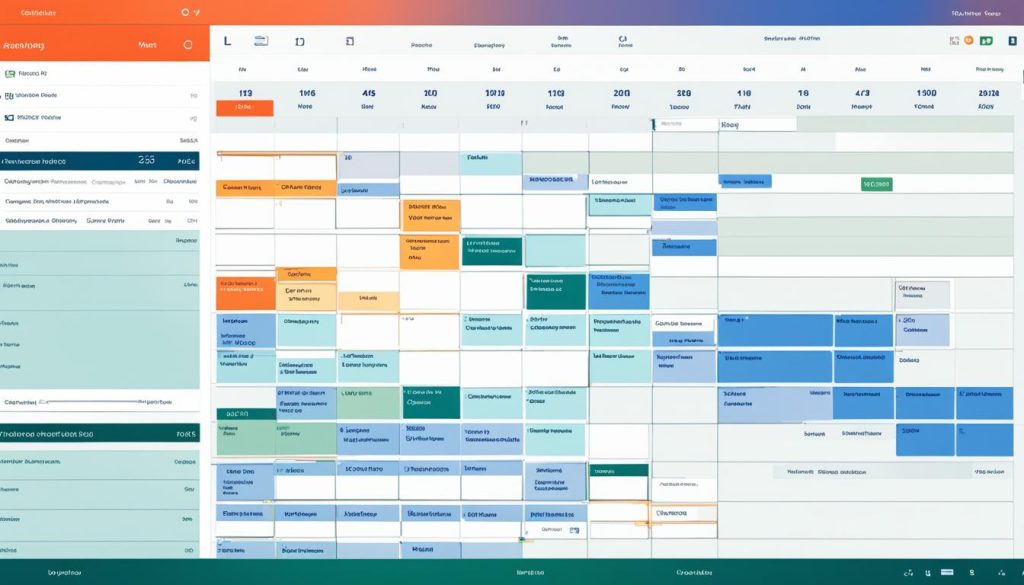Commercial field service software is a powerful tool for businesses in various industries, enabling them to streamline their operations and deliver exceptional customer service. Whether you’re in oil and gas, HVAC, IT services, facilities management, retail, healthcare, or manufacturing, implementing a field service management system can revolutionize the way you manage your field operations.
With commercial field service software, you can address common challenges such as poor customer service, underutilized equipment, high costs, low technician productivity, safety concerns, and disorganized job history and data. By embracing the right enterprise field service solutions, you can unlock a range of benefits and take your business to new heights.
Key Takeaways:
- Commercial field service software streamlines operations and improves customer service.
- Field service management systems increase productivity and the number of jobs completed per day.
- Efficient scheduling capabilities optimize technician assignments and reduce travel time.
- Field service management software benefits industries such as oil and gas, healthcare, and manufacturing.
- Implementing best practices and embracing field service management software is crucial for success.
Benefits of Field Service Software for Efficient Scheduling
Field service software offers a wide range of benefits that help businesses overcome the challenges of dispatching technicians and managing appointments. With its advanced features and capabilities, businesses can streamline their operations, improve productivity, and enhance customer satisfaction.
Real-Time Scheduling and Appointment Optimization
One of the key advantages of field service software is its real-time scheduling functionality. This feature allows businesses to instantly assign new job assignments to technicians and optimize their schedules for maximum efficiency. Technicians are immediately alerted to new job assignments, ensuring prompt response and minimizing delays. Additionally, the software helps plan the most efficient route between jobs, reducing travel time and optimizing resource allocation.
Matching Jobs to Technicians’ Skills
Field service software enables businesses to match jobs to technicians’ specific skills and expertise. By capturing critical information in one centralized location, the software ensures that the right technician is assigned to each job, leading to improved service quality and customer satisfaction. Technicians can access detailed task breakdowns, keeping them on track and ensuring that every aspect of the job is completed accurately and efficiently.
Comprehensive Reporting and Performance Evaluation
Field service software provides businesses with access to comprehensive reports on technicians’ job performance. These reports offer valuable insights into metrics such as job completion time, customer satisfaction ratings, and any issues or challenges encountered. By analyzing this data, businesses can identify areas for improvement, optimize workflows, and enhance overall operational efficiency.
Enhanced Customer Communication
Effective communication is crucial for successful field service operations. Field service software facilitates improved customer communication through features such as alerts and mobile apps. Customers can receive real-time updates on technician arrival times, appointment changes, and service status. This level of transparency and communication helps build trust and enhances the customer experience.
With its efficient scheduling capabilities, ability to match jobs to technicians’ skills, comprehensive reporting features, and enhanced customer communication, field service software is an invaluable tool for businesses. By embracing this technology, businesses can optimize their field service operations, improve productivity, and exceed customer expectations. Invest in field service scheduling software today to streamline your operations and stay ahead in the competitive business landscape.

Field Service Management for MSPs and the Growing Market Demand
Managed service providers (MSPs) have recognized the value of utilizing commercial field service software to drive their business models forward. The enterprise field service solutions catered to by field service management systems have been in high demand, with the global market projected to reach $10.81 billion by 2026. MSPs rely on these systems to oversee the deployment of skilled technicians and seamlessly blend remote service delivery with on-site support, optimizing resource availability and ensuring the quality and safety of field operations.
The implementation of a robust field service management system has empowered MSPs to achieve significant improvements in various aspects of their business, including heightened productivity. By leveraging commercial field service software, MSPs have reported an increase in the number of jobs completed per day. Additionally, this technology has been instrumental in enhancing the overall service quality, streamlining field staff scheduling, and ultimately boosting customer satisfaction.

As the demand for field service management solutions continues to grow, MSPs are well-positioned to capitalize on the benefits that come with utilizing commercial field service software. By incorporating these enterprise field service solutions into their work processes, MSPs can optimize their operations, deliver superior service to their clients, and stay competitive within their respective industries.
Industries That Benefit from Field Service Management Software
Field service management software is a valuable tool for industries that heavily rely on on-site service operations. Let’s explore how various industries benefit from the implementation of commercial field service software, field service management system, business service management software, and enterprise field service solutions.
Oil and Gas Enterprises
Oil and gas enterprises utilize field service management software to track assets, ensure worker safety, and improve maintenance work quality. The software enables them to effectively manage and monitor their extensive infrastructure, reducing downtime and ensuring the smooth operation of their operations. This results in increased efficiency, reduced costs, and improved overall performance.
HVAC Companies
HVAC companies rely on field service management software to streamline their operations. The software enables them to quickly dispatch technicians, schedule preventive maintenance visits, and track job progress. With improved scheduling and real-time updates, HVAC companies can ensure effective management of their service appointments and deliver exceptional customer service.
IT Service Providers
IT service providers benefit from the implementation of field service management software in several ways. The software enhances technician productivity, streamlines billing management processes, and enables progress tracking. By leveraging these solutions, IT service providers can provide efficient and timely support to their clients, improving customer satisfaction and optimizing resource allocation.
Facilities Management Companies
Facilities management companies utilize field service management software to manage work order tickets and streamline their operations. These solutions provide a centralized platform for managing and organizing work orders, enabling efficient assignment and tracking of tasks. With advanced features like real-time updates and reporting, facilities management companies can ensure smooth operations and maintain high levels of customer satisfaction.
Retail Companies
Retail companies leverage field service management software for appointment bookings, inventory tracking, and customer service. By implementing these solutions, retail companies can effectively manage their service appointments, optimize inventory levels, and ensure timely and efficient customer support. The software enables seamless communication between field service staff and customers, enhancing the overall customer experience.
Healthcare Institutions
Healthcare institutions rely on field service management software for various crucial tasks, including medical equipment delivery and installation, preventive maintenance, and repairs. These solutions help healthcare providers ensure the availability and optimal functioning of critical medical equipment, minimizing downtime and ensuring the highest level of patient care. By effectively managing field service operations, healthcare institutions can enhance operational efficiency and maintain regulatory compliance.
Manufacturing Companies
Manufacturing companies use field service management software to facilitate efficient car deliveries and maintenance planning. These solutions enable manufacturers to streamline their field service operations, ensuring timely deliveries, effective asset maintenance, and minimizing disruptions. By optimizing their field service processes, manufacturing companies can enhance their operational efficiency, reduce costs, and provide superior customer service.
Overall, field service management software is a game-changer for various industries. By implementing commercial field service software, field service management system, business service management software, and enterprise field service solutions, businesses can optimize their field service processes, improve customer satisfaction, and stay ahead of the competition.
Challenges Field Service Management Software Addresses
Field service management software plays a crucial role in addressing various challenges that businesses face across industries. By implementing commercial field service software, companies can efficiently manage their field staff and ensure customer satisfaction. Here are some key challenges that field service management software helps overcome:
- Inefficient communication: The software enables prompt and convenient communication between employees and customers, ensuring that important information is relayed in a timely manner. It facilitates seamless communication through mobile apps, alerts, and notifications.
- Job allocation and tracking: With field service scheduling software, businesses can easily assign jobs to technicians and track their progress. The software streamlines the process, allowing for efficient job dispatch and real-time tracking of tasks.
- Employee safety: Field service management software enhances employee safety, especially when technicians are working in unfamiliar environments. The software provides access to critical information about job requirements, site conditions, and safety protocols, ensuring that technicians are well-informed and prepared.
- Optimized technician assignment: The software helps businesses assign the right technician to each job based on their skills and qualifications. By matching the technician’s expertise with the job requirements, companies can ensure efficient execution and customer satisfaction.
- Poor customer service: Field service management software improves customer service by streamlining processes and providing accurate, up-to-date information. It enables businesses to respond promptly to customer queries, provide real-time updates, and exceed customer expectations.
- Wasted time: Through efficient route optimization and task breakdowns, field service management software helps minimize travel time and maximize technician productivity. This reduces wasted time and allows businesses to complete more jobs in a day.
- Cost-cutting: Route optimization and proactive maintenance enabled by field service management software help cut costs associated with excessive travel, inefficient processes, and asset downtime.
By addressing these challenges, field service management software revolutionizes business operations, improves customer satisfaction, and drives overall efficiency.
Field service management software streamlines business operations, enhances employee safety, improves customer service, reduces wasted time, and cuts costs. It is a game-changer in the modern business landscape.

Best Practices for Efficient Field Services
To effectively manage field services, businesses should follow these best practices.
- Efficient Planning and Scheduling: Utilize a reliable field service management system to plan and schedule field technicians’ assignments. This ensures optimal resource allocation and faster response times.
- Accurate Job Tracking: Keep track of job costs, non-billable hours, and asset-related information using a robust field service management system. This enables you to prepare professional quotes, bill clients accurately, and manage inventory efficiently.
- Seamless Communication: Facilitate seamless communication between field staff and management by leveraging a comprehensive field service management system. This enhances customer service and accountability.
- Regular Feedback and Discussions: Maintain an open line of communication with field service teams through regular feedback sessions and discussions. This helps identify operational inefficiencies and training requirements to continuously improve service quality.
- Self-Service Portal: Enhance customer experience by providing a self-service portal through your field service management system. This empowers customers to make changes to their appointments, ensuring flexibility and convenience.
- Integration with Other Platforms: Integrate your field service management system with other platforms to enhance automation and workflows across various business operations. This boosts efficiency and streamlines processes.

By implementing these best practices and utilizing a robust enterprise field service solution, businesses can achieve efficient field service operations, ultimately leading to improved productivity, enhanced customer satisfaction, and greater competitive advantage.
Conclusion
In conclusion, commercial field service software is an essential tool for streamlining business operations in various industries. With its efficient scheduling, dispatching, and tracking capabilities, this software enables businesses to improve productivity, enhance customer satisfaction, and reduce costs. Industries such as oil and gas, HVAC, IT services, facilities management, retail, healthcare, and manufacturing can optimize their field service processes by implementing field service management systems.
By embracing commercial field service software and following best practices, businesses can elevate their operations to new heights. This technology empowers companies to provide superior customer service, stay ahead of the competition, and adapt to the demands of the modern business landscape. Commercial field service software is a game-changer, transforming the way businesses manage their field operations and ensuring long-term success.
Don’t miss out on the benefits of commercial field service software and the field service management system. Take your business to the next level by embracing this powerful tool and revolutionize your field service processes today!




No comments! Be the first commenter?